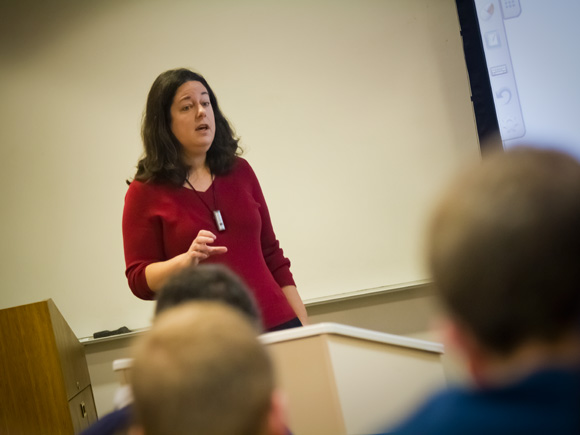Pursuing Justice Near and Far
 Professor Pam Saunders
Professor Pam Saunders
As a third generation lawyer, Professor Pam Saunders just might have a trace of ink from The Bluebook coursing through her veins.
Law is a family tradition for Saunders, whose trail-blazing grandmother attended law school in the 1930s and then went on to represent Japanese-Americans after World War II. Saunders’ father also devoted himself to a legal career in public interest, serving as a public defender in the Bronx.
“My father was deeply committed to the principles of a system in which every person has a right to counsel and to a fair trial, even as he was well aware that the existing legal system was fraught with flaws,” said Saunders, who joined the law school faculty on a permanent basis in the fall after teaching here as a visiting professor for two years. As she grew up, Saunders’ outlook reflected her family’s commitment to using the law to advance social justice.
Those interests have taken full flower in Saunders, who graduated from law school in the aftermath of court rulings that resuscitated the nation’s longstanding but unutilized Alien Tort Statute, which allows non-citizens to bring claims of international-law violations in U.S. courts.
After completing a clerkship with Judge Paul V. Niemeyer of the U.S. Court of Appeals for the Fourth Circuit, Saunders focused her practice on the intersection between U.S. and international law. Having completed a prestigious one-year Bristow Fellowship with the Office of the Solicitor General, Saunders served as counsel for O’Melveny & Myers, working in the firm’s Supreme Court and Class Action groups. There, she was involved with appeals concerning the Alien Tort Statute, as well as foreign relations law, civil rights law, and a host of procedural issues relating to class actions.
Saunders also taught as an adjunct at Duke University School of Law, from which she’d graduated with the highest academic average in her class and where she’d served as a member of the Moot Court Board and as executive editor of the Duke Law Journal. She then pursued her deep interest in international law by working as a lawyer for the U.S. State Department’s Office of the Legal Adviser, representing the federal government in overseas diplomatic property matters.
Eager to explore law from an academic perspective, Saunders joined the law school faculty in 2010, focusing her scholarship on the complexities of enforcing laws that emerge from different legal systems.
The difficulties of merging U.S. and international law becomes clear, Saunders notes, in cases like one now pending in the U.S. Supreme Court in which a Nigerian woman is attempting to sue a multinational oil company for alleged abuses of human rights while exploring for oil in the African nation.
“It is difficult to create effective ways of enforcing human rights obligations,” Saunders said. “The Alien Tort Statute might offer a remedy, but it’s not necessarily the most effective way to change behavior. It has potential to influence corporate behavior that might not otherwise be regulated, but the U.S. Supreme Court seems to be uneasy about allowing international law claims against corporations.”
In June, Saunders presented some of her research on a promising approach to enforcing human rights law at a conference in the Netherlands.
Back on campus, Saunders finds herself working with students whose commitment to justice and international law make them seem almost like family.